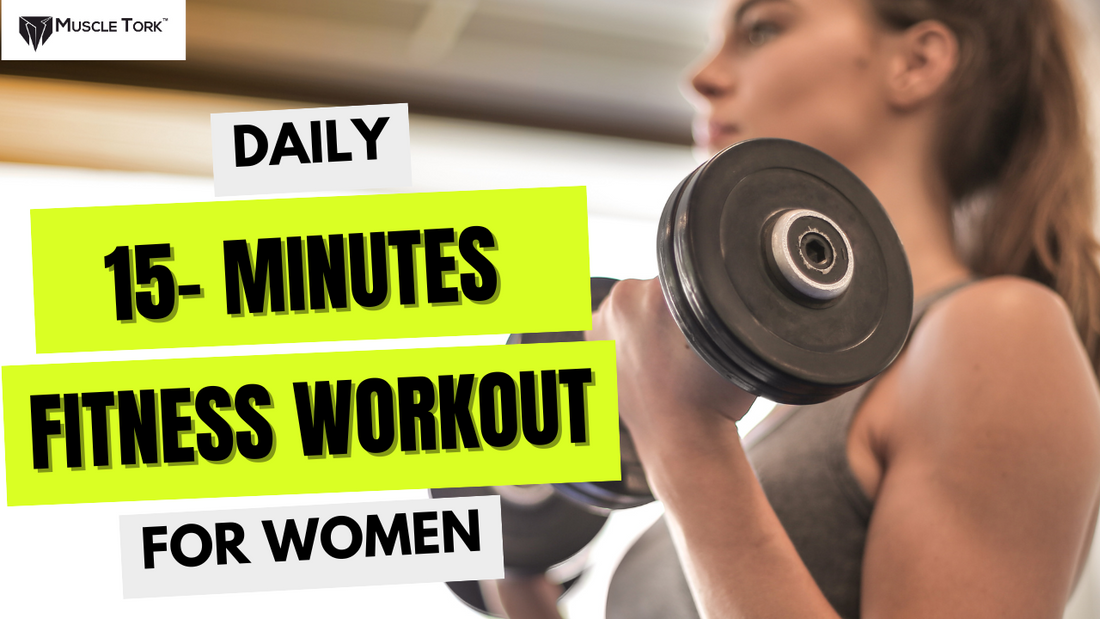
15-Min Daily Fitness Workout for Women: A Guide to Strength and Nutrition
Share
Muscle Tork, we understand that balancing fitness with a busy life can be challenging for women. Our 15-minute daily workout plan is designed to give you a highly effective routine, combining strength, cardio, and flexibility to ensure you feel strong and energized every day. Paired with a simple, nutrient-rich meal plan, this guide will help you stay on track toward your fitness goals.
Why 15 Minutes Works
You don't need long hours in the gym to see results. Short, high-intensity workouts have been proven to:
- Increase fat burn: Boost your metabolism even after you’re done working out.
- Tone muscles: Target all major muscle groups for balanced strength.
- Enhance cardiovascular health: Improve heart and lung function.
- Fit your schedule: Perfect for busy women balancing work, home, and personal time.
The 15-Min Workout Plan
This full-body workout can be done anywhere, with no equipment needed. Here's a breakdown of exercises:
1. Warm-Up (2 mins)
Get your heart rate up and muscles loose with light cardio:
- Jogging in place or jumping jacks: 1 minute.
- Arm circles and leg swings: 1 minute.
2. Main Workout (12 mins)
Perform each exercise for 45 seconds, followed by a 15-second rest. Repeat the circuit twice.
- Squats: Works the thighs and glutes. Make sure your knees don't go beyond your toes.
- Push-ups (modified or standard): Strengthens chest, arms, and core. Keep your back straight.
- Plank: Hold for core stability and strength.
- Reverse Lunges: Step back and lower into a lunge, alternating legs. Strengthens legs and improves balance.
- Mountain Climbers: A cardio move that engages the core and gets your heart rate up.
- Glute Bridges: Lie on your back, lift your hips toward the ceiling to strengthen glutes and lower back.
3. Cool Down (1 min)
- Stretch your hamstrings, calves, and shoulders to help muscles recover and improve flexibility.
How to Progress
- Increase intensity: Once the workout feels easier, reduce rest time, increase reps, or try more challenging variations.
- Add weights: Hold light dumbbells or water bottles during squats and lunges to increase resistance.
- Track your progress: Set goals and log how many reps or rounds you complete each session.
Nutrition Planning for Optimal Results
Exercise is only half the equation. Proper nutrition fuels your workouts, aids recovery, and supports your overall health.
Key Nutrients to Focus On:
- Protein: Essential for muscle repair and growth. Aim for 20–30 grams of protein per meal. Sources include eggs, chicken, beans, lentils, and protein shakes.
- Healthy Fats: Support brain function and hormone balance. Choose fats like avocados, olive oil, fatty fish, and seeds.
- Carbohydrates: Provide energy, especially important before your workout. Choose whole grains, vegetables, fruits, and legumes for sustained energy.
- Fiber: Aids digestion and keeps you full longer. Get fiber from vegetables, fruits, and whole grains.
- Hydration: Water is vital for every function in the body, especially before and after workouts. Aim for 8–10 glasses of water daily, and more if you're active.
Sample Day of Meals:
- Breakfast: Oatmeal with chia seeds, almond butter, and fresh berries.
- Mid-Morning Snack: A boiled egg and a piece of fruit.
- Lunch: Grilled chicken wrap with whole wheat tortilla, avocado, and leafy greens.
- Afternoon Snack: Carrot sticks with hummus or a protein smoothie.
- Dinner: Baked salmon with quinoa and roasted vegetables.
- Evening Snack (optional): Greek yogurt with a drizzle of honey and nuts.
Supplementation Tips:
If you're struggling to meet your nutritional needs through food alone, consider the following supplements:
- Protein powder: Ideal for a quick post-workout shake.
- Multivitamins: Ensure you're getting all essential vitamins and minerals.
- Omega-3 fatty acids: Support brain and heart health.
Additional Tips for Success:
- Stay consistent: Even 15 minutes a day adds up over time.
- Prioritize rest and recovery: Rest days are important for muscle repair and to prevent burnout.
- Get enough sleep: Aim for 7–9 hours of quality sleep for optimal performance and recovery.
- Listen to your body: Don’t push through pain; modify exercises if necessary.
